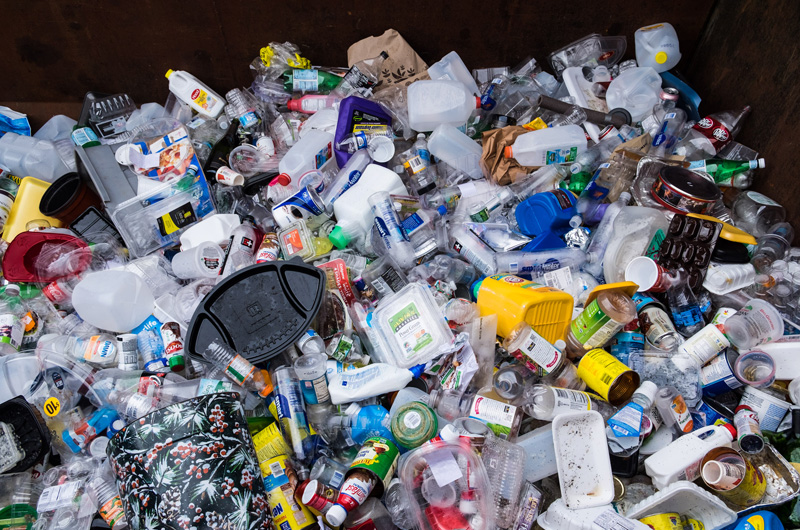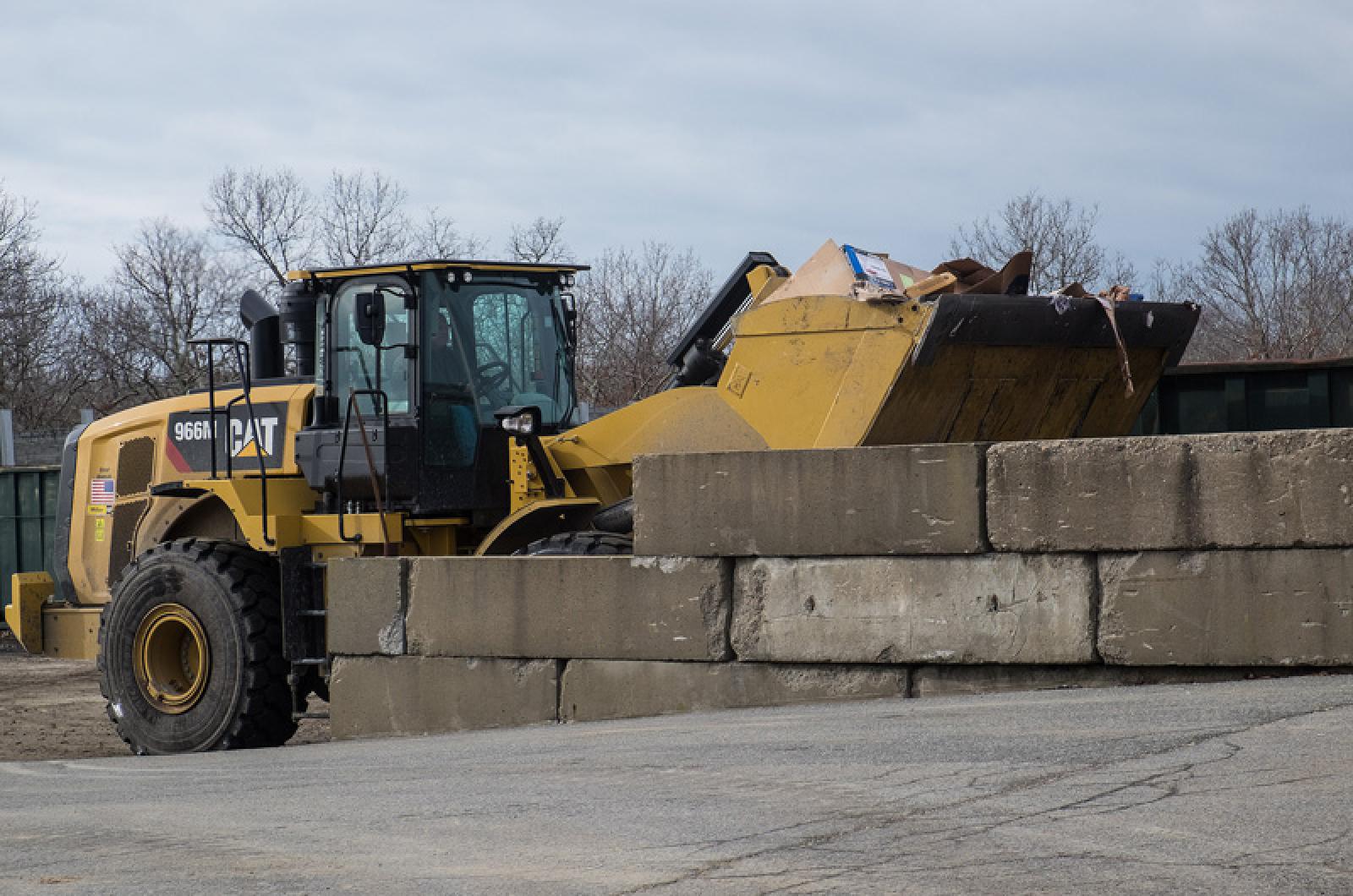A decision by the Chinese government has rippled all the way to the curbside of nearly every Martha’s Vineyard home, where residents will see an immediate increase in the cost of trash pickup and recycling.
Effective Jan. 1, China is no longer accepting many kinds of recyclable materials from other countries. Until recently, about 30 per cent of U.S. recyclable materials were processed by Chinese companies, which turned the bottles, cans, plastic and waste paper into raw materials that helped fuel China’s industrial boom.
China now says the process of recycling caused too much pollution and that too much of the bulk recycling contained non-recyclable trash.
About three years ago, Island recyclables were worth money. Companies paid to take them, though the price did not cover the cost to haul the materials by truck to recycling facilities. Still, it was far less expensive than hauling and paying a facility to take trash.
Changes in the recycling marketplace were already changing the economic equation over the past few years, Vineyard solid waste managers said. But the decision by Chinese officials turned it upside down in a few short months.
“We’ve gone from getting paid $35 a ton for a product that was worth something, to now paying $75 a ton, which is more than the cost we pay to get rid of trash,” said Josh Forend, general manager of Bruno’s Waste Management, the Island’s largest private trash hauler. “This is a direct result of what’s happening overseas.”
Don Hatch, manager of the Martha’s Vineyard Refuse District, said the economic reversal hasn’t caught up with residents yet.

“A lot of people don’t realize they pay for this through their taxes; they think recycling is free and we receive money for selling it,” said Mr. Hatch.
The refuse district includes Edgartown, West Tisbury, Chilmark and Aquinnah.
Residents of Oak Bluffs have trash picked up by the town, but there is no curbside pickup for recycling. Oak Bluffs residents can drop off recycling at the town dropoff center at no cost save a small fee for a sticker.
Residents of Tisbury have the option of hiring a private contractor for curbside pickup of trash and recycling, or having the town of pick it up. Tisbury, however, no longer provides its own service — the town contracts with Bruno’s for curbside pickup.
Price hikes for trash and recycling will take effect over the next few weeks for many residents.
Effective Feb. 15, the cost of disposing of a bag of trash at dropoff centers in the four towns that are members of the refuse district will increase from $4 to $5. Fees for other trash, such as tires, brush, or appliances, will also increase. There will still be no fee for separated recyclables.
Mr. Hatch said the price hike is the first in more than a decade. “That price increase was scheduled for July 1, but because of this unexpected increase in the middle of our budget year, we’re doing a price increase as of Feb. 15,” he said.
But it will only absorb about half of the newly-increased cost of sending recycling off-Island. As a result, town assessments will also see an increase in the coming fiscal year.
The refuse district processes and ships some 7,000 tons annually of waste and construction material; about 1,000 tons of that is recyclables. Mr. Hatch projects it will cost $142,000 to transport bulk recyclables and pay a facility to take them. Revenue from stickers and dropoff fees will offset the cost by approximately $67,500, leaving $74,900 to be paid by the individual towns. That represents an increase of $35,000 over the current fiscal year.
Edgartown’s assessment will increase by approximately $24,300. West Tisbury’s assessment will increase by $5,300, Chilmark by $4,100, and Aquinnah by $1,000.
The total refuse district budget in 2018 is $1.54 million. The draft budget for 2019 is $1.66 million.
Meanwhile, for individual customers of Bruno’s Waste Management, the cost of recycling will rise substantially. Currently, customers pay $8.95 per pickup for recycling every other week. Effective March 1, the cost will rise to $15.95 per pickup.
“We’re used to fluctuation in the market, we’re used to ups and downs,” said Mr. Forend. “Every time it changes we don’t try to change pricing. But it’s been on such an up, and the outlook is worse before better, that we have no choice but to do this now.”
Bruno’s is currently in talks with the town of Tisbury about amending its contract. A public hearing with the selectmen opened two weeks ago and is scheduled to continue Feb. 20.
In addition to the price increase, customers will soon see stricter rules for what can be recycled. Both Mr. Forend and Mr. Hatch said they will initiate some educational efforts, including letters, flyers and lots of interaction with consumers, both at the curbside and at the dropoff centers. Plastic bags of any kind, non-food plastics, and recyclables with food waste on them, will be refused.
“We’re going to be stricter as time goes on,” said Mr. Hatch. “If we let our loads go off dirty we’re going to start paying more per ton. Pizza boxes that have grease on them are no longer accepted. We’re going to watch and communicate more, so everybody understands why we’re getting stricter.”
Mr. Forend said consumers have gotten used to lax enforcement, and are going to have to get used to more careful sorting at the curbside.
“Back to rinsing out stuff, taking labels off, old-school recycling,” said Mr. Forend. “Nowadays when we go up to a recycle bin, we have a hard time distinguishing whether it’s trash or recycling. After some educational letters go out and letting people know what the situations are, we will start refusing recycling because its the only way. If we continue to accept a dirty product, it’s going to be worthless. We won’t be able to throw it away or recycle it.”
With the current economics of recycling, it might be cheaper to simply put recyclables in the trash stream. All the trash generated on the Island is now trucked to an off-Island incinerator and burned to produce energy.
But Massachusetts regulations ban many products from being thrown away, including glass, metal and plastic containers, paper, cardboard, large appliances, televisions, and other items. State inspectors closely monitor the amount of recyclable material getting into the trash stream, and can sanction trash processors accordingly.
At this point, Island officials are hoping for an economic miracle.
“Recycling is out of our control,” said Mr. Forend. “Until we can figure out a way to fix it, we just have to be part of the system.”
“I’m hoping some avenues open up in the country somewhere, to relieve some of the pressure and cost before summer comes,” said Mr. Hatch.
An earlier version of this story reported incorrectly on cost increases for inividual customers of Bruno’s. The increase from $8.95 to $15.95 per pickup is for recycling only, not trash and recycling.







Comments (19)
Comments
Comment policy »